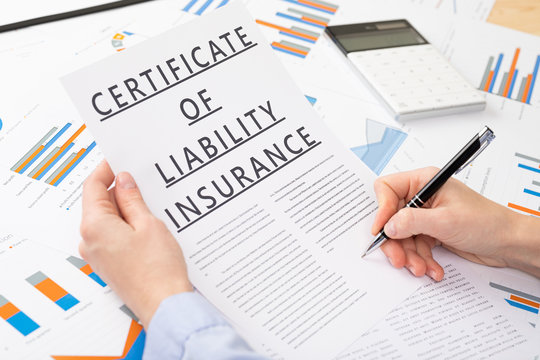If your company rents property from another company or does work for another company, the owner of the property or the company that hired your company may request a certificate proving that your company carries liability insurance (COI). A certificate of insurance (COI), which is analogous to a driver's license for auto insurance, is used to establish that your company is fully protected against claims made by third parties. Because COIs are used in a wide variety of everyday business activities, it is important for owners of businesses to be familiar with what COIs are, why they are used, and how to obtain one.
Key Takeaways
- As evidence that you are covered by liability insurance, a certificate of liability insurance, often known as a COI, will provide a summary of your liability policies.
- A certificate of insurance (COI) is not the same thing as an insurance policy and does not offer any coverage.
- Before you are allowed to begin any work or lease any property, you could be required to present a certificate of insurance first.
- Contacting your insurance agent or provider and submitting a written explanation of the minimum coverage criteria are the two steps necessary to obtain a certificate of insurance (COI).
What Exactly Is a Certificate of Insurance for Liability?
A certificate of liability insurance, often known as a COI, is a document that provides an overview of the liability insurance coverage held by your business. It acts as confirmation that your company has obtained liability insurance of some kind, whether it be a general liability, car liability, or another sort of liability insurance. This paper does not give a comprehensive coverage analysis but rather offers an overall summary of your liability policies. A certificate of insurance is primarily concerned with liability protections; nonetheless, it is neither an insurance policy nor does it offer any protection of its own. Instead, it highlights important characteristics of your policies, such as the effective dates of your policies, their policy numbers, and the limits of their liability coverage. There are a variety of variants of the COI that are utilized for property insurance as well as other types of insurance, such as automobile and liability. Your company is safeguarded against claims brought forth by third parties for bodily injury, property damage, personal injury, and advertising injury when it possesses general liability insurance.In What Circumstances Is an Insurance Certificate Required?
If your firm is leasing a new facility or piece of equipment, or if it is trying to get employed by another company to conduct work or offer a service, you will almost certainly require a certificate of insurance. Before beginning any work or signing a lease, the firm that is hiring you could first want to see a certificate proving that you are qualified for the job. Because of this, you should contact your insurance agent or provider as soon as you realize you'll need a certificate and ask for one to be mailed to you.What Kind of Information Is Contained in an Insurance Certificate?
The Association for Cooperative Operations Research and Development (ACORD) is a not-for-profit research organization serving the worldwide insurance business. Many insurance companies provide certificates of insurance on standard forms produced by ACORD. Others make use of templates that they have created on their own. Regardless of the form that is utilized, a certificate of insurance (COI) gives an overview of the commercial liability insurance held by your organization. Typically, it contains the following pieces of information:- The name and address of the producer (An "agent" or "broker" is what the industry calls a "producer.")
- The name, location, and contact information of your organization
- A listing of insurance companies who are willing to cover your company
- Specifics regarding your organization's liability coverage, which may comprise workers' compensation, general liability, car liability, and/or umbrella liability, among other options. Include the policy numbers, effective dates, and the maximum payout that can be expected from each policy.
- A description of the operations, locations, and vehicles utilized by your firm (if applicable)
- The name and address of the person who holds the certificate (the business that requested the certificate)
- Signature of an individual who has been given permission by the insurance company to approve certificates of insurance


